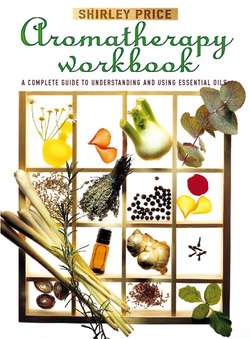Aromatherapy Workbook

Реклама. ООО «ЛитРес», ИНН: 7719571260.
Оглавление
Shirley Price. Aromatherapy Workbook
Aromatherapy Workbook. Shirley Price
Table of Contents
Introduction
1 Setting the Scene. The Mists of Time
The Indian Story
The Influence of Egypt
Greece’s Contribution
The Roman Contribution
Early Distillation
Development in the Middle Ages
Aromatic Waters
Progress in Britain
Scientific Development
Enter Aromatherapy!
Aromatherapy or Perfumery?
Research and Clinical Trials
2 Extraction Methods
Steam Distillation
Aromatic Waters
Carbon Dioxide Extraction
Hydro-Diffusion or Percolation
Expression
Solvent Extraction
Adulteration
What is Adulteration?
Fractionation
Rectification
Synthetic Oils
Quality
Gas-Liquid Chromatography
Organically Grown Oils
3 Aromachemistry – the Chemistry of Essential Oils
Atoms
Molecules
Isoprene Units
Terpenes
Chain Building Blocks (Aliphatic)
Ring Building Blocks (Aromatic)
The Addition of Oxygen
Alcohols
Phenols
Aldehydes
Ketones
Acids and Esters
Oxides
Lactones
Coumarins and Furocoumarins
Ethers (Not to be confused with esters)
Conclusion
Electrical Classification of Essential Oils
4 Plant Families
Abietaceae (or Pinaceae)
Annonaceae
Apiaceae (or Umbelliferae)
Asteraceae (or Compositae)
Burseraceae
Compositae, see Asteraceae. Cupressaceae
Geraniaceae
Graminae, see Poaceae. Lamiaceae or Labiatae
Lauraceae
Myristicaceae
Myrtaceae
Oleaceae
Pinaceae, see Abietaceae. Piperaceae
Poaceae (or Graminae)
Rosaceae
Rutaceae
Santalaceae
Styracaceae
Umbelliferae, see Apiaceae. Valerianaceae
Verbenaceae
Zingiberaceae
5 Perplexing Essential Oils – What’s In a Name?
Basil (Lamiaceae)
Camphor (Lauraceae and Dipterocarpaceae)
Cedarwood and Juniper (Abietaceae and Cupressaceae)
Chamomile (Asteraceae)
Clove (Myrtaceae)
Eucalyptus (Myrtaceae)
Geranium (Geraniaceae)
Juniper (Cupressaceae)
Lavender (Lamiaceae)
Lime (Rutaceae and Tiliaceae)
Marigold (Asteraceae)
Marjoram and Oregano (Lamiaceae)
Melissa (Lamiaceae)
Orange (Rutaceae)
Peppermint (Lamiaceae)
Pine (Abietaceae)
Rosewood (Lauraceae and Convolvulaceae)
Thyme (Labiateae or Lamiaceae)
Ylang Ylang
6 Safety of Essential Oils. Introduction
Herbalism and Aromatherapy
Synergy
Safety
CASE EXAMPLE
Helpful or Hazardous?
Effects of Essential Oils on the Skin
Skin Irritation
CASE EXAMPLE
Photosensitivity
CASE EXAMPLE
Allergy and Substance Sensitivity
Allergies
CASE EXAMPLE
Intolerance or Substance Sensitivity
Sensitization
CASE EXAMPLE 1
CASE EXAMPLE 2
CASE EXAMPLE 3
CASE EXAMPLE 4
7 Essential Oils: Storage, Carriers and Methods of Use. Storage
Carriers
Penetration
Air as a Carrier
Water as a Carrier. Baths
Vegetable Oils and Bland Lotion as Carriers
8 Carrier Oils
General Points About Carrier Oils
Maceration
Carrier Oils used in Aromatherapy
9 The Holistic Approach
Emotional Lifestyle
Nutritional Lifestyle
The RES
Exercise Lifestyle
Social Lifestyle
Practical Application
CASE EXAMPLE
10 Touch and Essential Oils. The Right Touch for Massage
Comfort of the Recipient
Comfort of the Giver
Aromatherapy Massage Principles
Empathy
What’s In a Hand?
Prime Factors of Massage
Main Massage Techniques
Possible Contra-Indications to Massage
Giving a Neck and Shoulder Massage
Self-Applied Neck and Shoulder Massage
Touch and Aromatherapy in Hospital
CASE EXAMPLE
11 Women’s and Children’s Problems. Menstrual Problems
PMS
Endometriosis
Vaginitis
Thrush
Menopause
Conception
Infertility
CASE EXAMPLE
CASE EXAMPLE
Essential Oil Choice
Pregnancy
The First 71/2 Months
The Last Six Weeks
New Mother
Babies
Children
12 Oils at Work in the Home. General Health Safeguards
The Kitchen
Living Room/Lounge
Bedroom
Bathroom
Holidays
Miscellaneous Methods of Use
Cooking with Essential Oils
13 Aromatherapy: Definition, Qualifications and Finding a Good Aromatherapist
1. Aromatherapy Without Massage
2. Connotations of Aromatherapy
3. Qualifications
Finding a Good Aromatherapist
Holistic Health and Aromatherapy
Aromatherapy Consultation
Essential Oil Selection
Aromatherapy Body Massage
Conclusion
CASE EXAMPLE
14 Therapeutic Uses of Essential Oils – Reference
Glossary
References. Chapter 1
Chapter 2
Chapter 3
Chapter 4
Chapter 5
Chapter 6
Chapter 7
Chapter 8
Chapter 9
Chapter 10
Chapter 11
Chapter 12
Further Reading
Useful Addresses. Aromatherapy products
Training Aromatherapy
Aromatherapy and specialized short courses
Aromatic medicine and aromatology
Aromatic medicine association
Aromatherapy Associations
Aromatherapy training and products
Training and products
Training
Aromatherapy Association
Stockists only
Index
Acknowledgements
About the author
Copyright
About the Publisher
Отрывок из книги
‘Fragrant oil brings joy to the heart and a friend’s support is as pleasant as perfume.’
Proverbs 27 v. 9
.....
It is possible to ‘read’ the formula of an essential oil using various techniques, the most common being the gas-liquid chromatograph (GLC). In this apparatus a minute amount of essential oil is injected into a temperature controlled, extremely fine, coiled, tubular column. The time taken (called the retention time) for each component to emerge from the other end of the column is different, depending on the molecule size. The quantity released is recorded, showing a peak on the trace (proportional to the quantity). This is a comparative test, not an absolute one, the retention time of known constituents having already been determined, to aid in the analysis.
As every batch of oil will vary in its percentages of components, one reading of each oil is kept as a ‘standard’. This standard can then be directly compared to that of another essential oil from the same plant.
.....